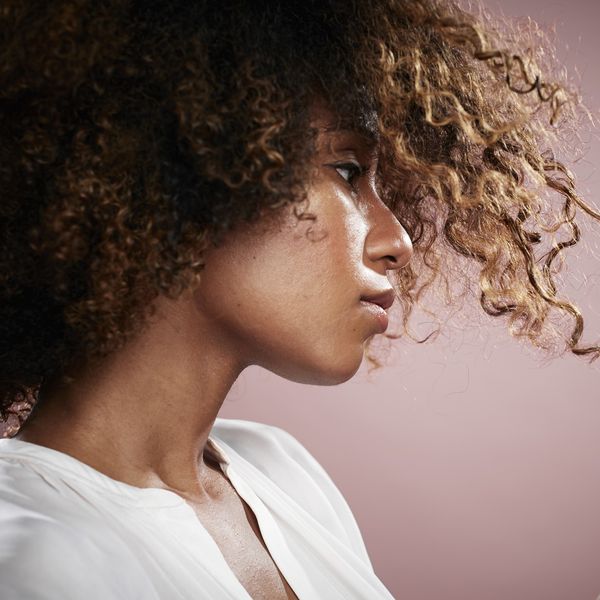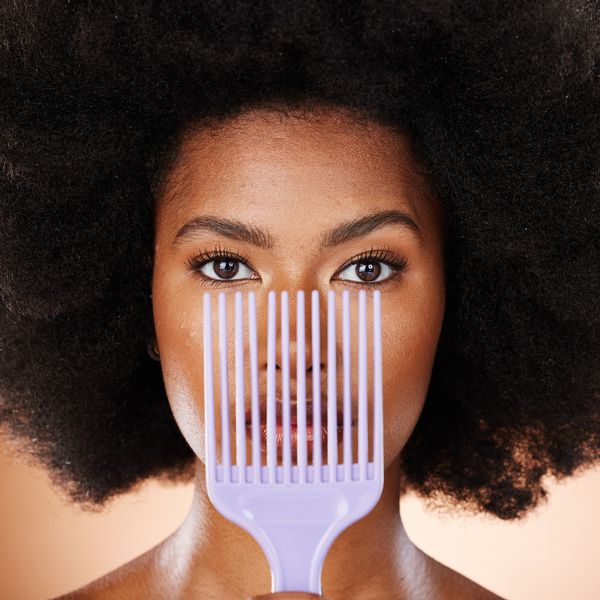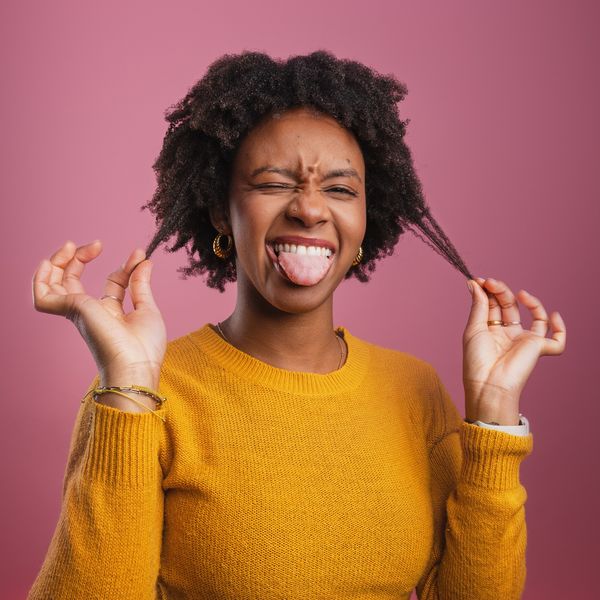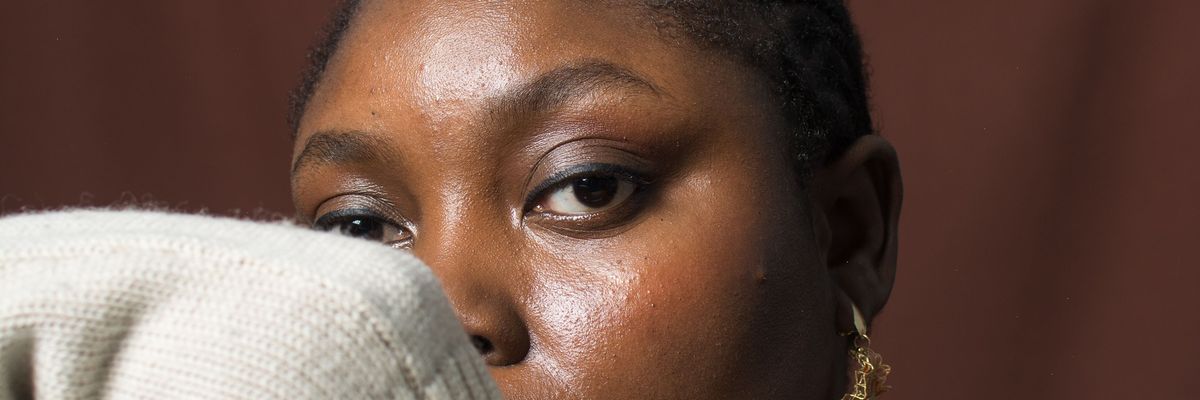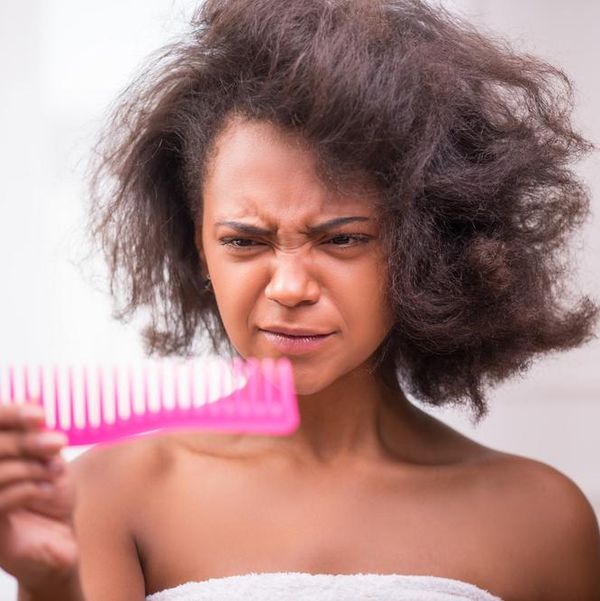
Aight. This is the kind of article that is pretty near and dear to my heart because, when it comes to caring for my scalp and hair, I have spent quite a few years trying to figure out the difference between when I've got dandruff and when my scalp is simply dry. And believe you me, it's not until you actually get that those two things are not one in the same, that you're able to get to the root of what may be causing your incessant itching, irritation and/or flaking, so that you can find some serious relief.
So, if you've already scratched your scalp once, even since reading this intro, and you're saying to yourself, "Enough is enough, dammit!", I've got some info that can definitely put you on the path towards healing your scalp and feeling much better overall.
What Is Dandruff?
So, here's the thing about dandruff. Every minute, our body sheds somewhere between 30,000-40,000 dead skin cells. Our scalp is certainly not exempt from this fact. Well, when dandruff occurs, it's the result of our scalp shedding an accelerated amount of cells. As a result, there is oftentimes noticeable flaking (flakes that are pretty large and oftentimes greasy in texture) and a significant amount of itching and scalp irritation.
As far as what causes dandruff, that is a pretty layered answer. For starters, there is a fungus/yeast that lives on most of our scalps caused Malassezia. When Malassezia gets out of control, it can result in dandruff (kind of like how when a yeast gets out of control in our vagina, it can cause a yeast infection). If Malassezia is what's triggering your dandruff, the dandruff probably won't go away until you get rid of the fungus/yeast (via topical or oral antifungal agents that may require a prescription by your doctor, depending on how bad it is). Something else that can cause dandruff to occur is a scalp that is too oily or has too much product build-up. This is problematic because oil and "gunk" is something that Malassezia actually feeds off of; that's why it's so important to keep your scalp and hair clean by washing them every 10 days or so.
Two other things that can cause dandruff that aren't discussed enough are bacterial infections and allergies. Both of these can result in the speeding up of dead skin cells. On the allergy tip, if you happen to try a new product and your scalp doesn't like it, it could end up shedding more skin cells in order to remove the product which could also cause dandruff.
As I said, dandruff is the result of all kinds of stuff. Yet knowing the main ones can help you to get to the root of what could be giving you dandruff drama.
Home Treatments for Dandruff: How to Take Care of Dandruff
Now that you know what typically triggers dandruff, I'm pretty sure you're wondering if there is anything that you can do to prevent it or, at the very least, manage it. In many cases, definitely. For starters, you might want to look into using a shampoo that has salicylic acid in it. That's a type of dissolving agent that is actually found in foods like blueberries, avocados, and pine nuts. Anyway, what it does is soften the top layer of your scalp and wash away the extra dead skin cells, so that they're less itchy and irritating. Salicylic acid also has the ability to remove oily build-up and can soothe dermatitis if you happen to have that skin issue too. (By the way, if you're low on cash, you can crush a couple of aspirin up and put them into your shampoo. It works because aspirin has salicylic acid in it.)
Next, it's important that you increase your zinc and Vitamin B intake. It's been discovered that a lot of people who struggle with dandruff happen to be low in both of these nutrients. You can take them in supplement form or you can consume foods that are high in both of these vitamins. Foods high in zinc include meat, seeds, nuts, eggs, and whole grains. Foods high in Vitamin B include leafy greens, seafood, fortified cereals, yogurt, and poultry.
If you're looking for some at-home remedies for dandruff, here are a few that are pretty effective:
- Tea tree oil contains potent anti-microbial and anti-inflammatory properties that will fight fungus/yeast. Add a few drops of the tea tree oil to your shampoo for maximum results.
- Aloe Vera has antibacterial and antifungal properties that will not only help to protect your scalp from getting dandruff, it will also soothe your scalp as it heals from it. You can apply the gel directly to your scalp. Let it sit for about an hour and then shampoo and condition your hair as normal (just make sure the gel is 100 percent pure).
- Apple cider vinegar has the ability to balance the pH levels in your scalp. The more balanced your scalp is, the more challenging it is for fungus/yeast to thrive. Just apply one-part water and one-part apple cider vinegar as a rinse to your scalp on wash day. Let it penetrate for five minutes or so and then rinse with cool water.
- Listerine is something else that stops dandruff in its track. That's because the menthol it contains is a great fungus/yeast fighter. Simply mix two tablespoons of the mouthwash with a half-cup of distilled water. Use it as a pre-rinse before shampooing and conditioning your hair. Again, it's pretty effective.
- Manage your stress levels. It really is a trip, just how much of our overall health and well-being is tied into how stressed we are—or aren't. When it comes to dandruff specifically, when you're stressed out, your immune system is compromised. When that happens, it's easy for fungus/yeast to overtake your system.
If you try all of these DIY treatments and your dandruff does not improve, see your doctor or a dermatologist. You may need something more powerful to get the fungus/yeast under control. Also, do not skimp out on not conditioning your hair, thinking that it will help. Your scalp needs proper moisture; what it doesn't need is a ton of product build-up, so wash your hair no less than every 10-14 days (more around the 8-10 day mark while you're trying to manage your dandruff).
What Is Dry Scalp?
Now let's get into what dry scalp is all about. If you happen to live in a climate that is very dry or is extremely hot in the summer and bitterly cold in the winter; if you constantly wash your hair in hot water; if you've already got a skin condition (like eczema); if the rest of your skin is dry, or if you're dehydrated (check out "10 Overlooked Signs That You're Dehydrated"), you are definitely someone who is prone to have dry scalp.
That's because dry scalp is what happens as the direct result of your scalp not getting enough of the oil that it needs in order to stay moisturized. And, just like the rest of your body, when your scalp is parched, that can make it itchy, irritated, and can result in small flakes of dead skin coming up.
It should probably also go on record that aging can also subject you to having dry scalp, simply because, as you get older, it can be harder for your scalp to hold onto the natural sebum that your body produces. By the way, it is quite possible that you can have dandruff and dry scalp at the same time; although, if you adhere to the tips that I already provided regarding dandruff, you should be able to tell the difference between the two in no time.
Home Remedies for Dry Scalp: How to Treat Dry Scalp
As far as dry scalp goes, there are several at-home remedies that can quickly get you on the path to some real relief.
- First, it's important that you drink plenty of water. As we've already discussed, dehydration plays a real role in dry scalp, so the more water you've got into your body, the better.
- Something that can help to moisturize and heal your dry scalp is coconut oil. That's because it's an oil that has antifungal and antibacterial properties that can help to keep fungus/yeast at bay. If you're someone who likes to "oil your scalp", applying a little bit of it once or twice a week can help to make dry scalp a thing of the past.
- Foods with omega-3 fatty acids in them can help to deeply penetrate your scalp and give it extra moisture from the inside out. Some foods that have those acids in them are salmon, chia seeds, flaxseeds, walnuts and algae. While we're on the topic of diet, it's a good idea to eat more moisturizing foods, period. For some suggestions, check out "These Foods Will Give Your Skin & Hair The Moisture They Crave" on our site.
- A great rinse for dry scalp is witch hazel. It contains some powerful astringent properties that can cleanse your scalp without stripping it dry. Combine one-part witch hazel with one-part water, along with five drops of lavender essential oil (it's got antimicrobial and antibacterial properties) and five drops of sweet almond oil (it's a deep conditioner). Pour all of this onto your hair before shampooing it. Gently massage your scalp and then shampoo and condition as usual.
- Add some jojoba oil to your shampoo. It has Vitamin E and zinc in it which will help to soothe your dry scalp while moisturizing it at the same time.
Dandruff and dry scalp can both be a pain, no doubt. Yet, more times than not, they are both pretty easy to manage, so long as you know exactly what you've got and you are consistent in applying remedies to them. Here's to being scalp healthy and itch-free, sis. For real, tho.
Featured image by Shutterstock
- How To Prepare Your Natural Hair For The Summer - xoNecole ... ›
- The Real Reason Your Stylist Makes You "Come Washed" ›
- How To Strengthen Weak Hair Follicles - xoNecole: Women's ... ›
- Hair Growth: Natural Ways To Make Your Hair Grow Faster ... ›
- How to Maintain Your Scalp in Between Detoxes - xoNecole ... ›
- How To Detox Your Scalp - xoNecole: Women's Interest, Love ... ›
- How To Stop Dandruff In Natural Hair - xoNecole: Women's Interest, Love, Wellness, Beauty ›
Your December 2025 Monthly Horoscopes Are All About Surrender & Alignment
December is about letting go. We end the year with the need for more peace, reflection, and rejuvenation, and that is exactly what December is providing for us. The Sun is in Sagittarius, and anything is possible. This is the month to believe in that and to know that the universe is supporting you. With a Supermoon in Gemini as we begin the month as well, we have an opportunity to gain the closure we have been looking for this year and to wrap up old projects, ideas, and communication breakthroughs.
This is the month to make your peace the priority and let go of trying to control the way the tides are turning. Trust in your new beginning, and give yourself time to prepare for it this month.
A big part of the clarity that is coming through this month is due to Neptune going direct in Pisces on December 10, after being retrograde here since July. With Neptune now direct, we are able to see our inspiration and creativity a little more clearly, providing the perfect energy for dreams and manifestation to be built upon. The smoke is clearing, and it’s up to you to decide what you want to do with this newfound clarity that this transit is bringing. Mercury also moves back into Sagittarius on December 11, which is great for communication and clarity, and the adventures you were trying to see through at the beginning of November come around for you again with greater purpose and support.
On December 15, Mars enters Capricorn until the end of January 2026, and this is the extra push we need to make important changes and to be on the path towards greater abundance, stability, and prosperity. Mars in Capricorn takes care of business, and we have extra energy at our disposal during this time to do so. This transit is an ideal time to focus on your career or financial goals for next year and to start putting some of these plans into motion now. A few days later, we have the New Moon of the month, which will be in Sagittarius on December 19, and this is the perfect New Moon to manifest.
The energy is high, magic is in the air, and it’s all about moving forward with the new beginnings that are inspiring you and bringing you joy to think about right now.
Capricorn Season officially begins on December 21, and this earth sign energy is how we heal, gain closure, and build new foundations in our world. With Venus also moving into a Capricorn a few days later, there is something about peace, prosperity, and security that we are gaining in life and in love as we close out the year, and this is what we need right now. This month is about reflecting on what was, letting go of old hurt, and renewing. December is an ending and a new beginning in one, and there is magic in this space to be created.
Read for your sun and rising sign below to see what December 2025 has in store for you.
 AriesKyra Jay for xoNecole
AriesKyra Jay for xoNecoleARIES
December is a full-circle moment for you, Aries. You are seeing the gifts in your world and have a lot of gratitude for the way things have come about for you as of late. There are culminations in your world that are providing you with more abundance, stability, and community, and you are exactly where you are meant to be this month. With the Sun in a fellow fire sign and in your 9th house of travel for most of the month, December is a good time to get out of your comfort zone, explore the world around you, and get your body moving.
Mars, your ruling planet, also makes a change and moves into Capricorn on December 15, which will fuel your inspiration and power in your career space. You are making a lot of professional progress as we close out the year; however, make sure to be more mindful of your competitive drive right now. The New Moon on December 19 is the perfect opportunity for you to create some new plans and goals when it comes to traveling, education, and where you want to gain some new inspiration in your world. Overall, this is a month of things coming together for you serendipitously.
 TaurusKyra Jay for xoNecole
TaurusKyra Jay for xoNecoleTAURUS
December is about trusting your intuition, Taurus. You have a lot on your mind this month, and it’s best to delegate, communicate, and allow yourself some relief by opening up to someone and not feeling like you have to hold everything in. As we begin the month, we have a Supermoon in Gemini happening in your house of income, and the plans and projects you have been building here come to fruition for you now. This is the time to gain clarity on your financial world and to take a look at what spending habits you want to let go of here as well.
With Venus in your 8th house of shared resources for most of the month, you are doing a cleanse on your commitments, partnerships, and business ventures. You are taking a look at what you want to dedicate yourself to in the future, and what commitments you may need to let go of now in order to be in the space you truly want to be, both financially and within some of your relationship dynamics. Before we end the month, we have a New Moon in this same area of your chart, and it’s time to look at the opportunities that are presenting themselves and to trust your internal guidance system to lead you forward.
 GeminiKyra Jay for xoNecole
GeminiKyra Jay for xoNecoleGEMINI
You are moving forward fearlessly this month, Gemini. December is your month of love, passion, and dignity, and you are owning the light that you shine. We begin the month with the last Supermoon of the year, happening in your sign, and you are stepping up to the plate. You are showing up, owning how much you have grown this year, and allowing yourself to heal while also acknowledging that you have done your best and you deserve to have fun in the midst of the changes you are creating.
Mercury, your ruling planet, is officially out of retrograde, and you can use this energy to the fullest potential now. With Mercury in your 7th house of love, it’s time to speak from the heart and to talk about the things that matter and that are inspiring you right now to your loved ones. You never know what kind of epiphanies you may have when you open up the conversation to others. Before the month ends, you have a New Moon in this same love area of your chart, and this New Moon is all about manifesting romance, commitment, and abundance in your world.
 CancerKyra Jay for xoNecole
CancerKyra Jay for xoNecoleCANCER
December is an opening for more love, more joy, and more freedom in your life, Cancer. You have come to a place where you hold so much gratitude in your heart for where you are today and where your heart is shining, and things come together for you with more ease right now. With the Sun in your 6th house of health, work, and daily routines for most of the month, you are getting your ducks in a row while also putting more energy and effort into taking care of yourself, your priorities, and your well-being. This month surprises you in many ways, and it’s because you are showing up.
Mars and Venus both move into your house of love, relationships, marriage, and abundance this month, and you are making strides in your love life. You have both of these opposing forces on your side and are being recognized for the love you are while also receiving the love you want. This month, overall, is about focusing more on the positives in your world and letting your heart have its joy. Before December comes to an end, there is a New Moon in Sagittarius, and this is the perfect opportunity to create the plans you want to see through next year, especially when it comes to your work life, colleagues, business ventures, and health.
 LeoKyra Jay for xoNecole
LeoKyra Jay for xoNecoleLEO
The scales of karma are balancing, and they are balancing in your favor this month, Leo. December is your month of truth, and of seeing it clearly in your world. The Sun is in your house of romance, pleasure, and happiness for most of the month, and it’s time to relax, be in the present moment, and allow what is meant to be, to be. With a Supermoon in your 11th house of manifestation as December begins, this is a powerful month for seeing your dreams come to fruition, and for feeling like the intentions you have set this year are finally here for you now.
Mars also moves into your 6th house mid-month, and this is the perfect energy to have to move into the new year. You have extra energy at your disposal right now and are feeling fearless with what is possible for you and your daily routine. Before the month ends, we also have a New Moon in a fellow fire sign, Sagittarius, and this is a breakthrough moment for you and your heart. December, overall, wants to show you how loved and supported you are and will be doing so in magical, unexpected, and concrete ways.
 VirgoKyra Jay for xoNecole
VirgoKyra Jay for xoNecoleVIRGO
December is a month of victory, Virgo. You are showing up and experiencing some new successes in your world that move you forward on your path in life. With a Supermoon in your 10th house of career as we begin the month, the effort and intentions you have made this year come into full bloom, and you are being recognized for who you are and the good work you have done. This month is all about showing up and allowing yourself to be seen and loved, knowing that you deserve the support and opportunities you are receiving.
Mars moves into Capricorn on December 15, which brings the passion and excitement into your love life, hobbies, and little pleasures in life that light you up. You want to have fun this month and are going to be walking into the new year with this fearless, happy, and spontaneous energy within you. Before the month ends, Venus also enters Capricorn, and in this same area of your chart, you have a lot to look forward to and believe in right now. Overall, December wants you to be happy and will be doing everything possible to make that happen for you. This is your month to shine, Virgo.
 LibraKyra Jay for xoNecole
LibraKyra Jay for xoNecoleLIBRA
December is a month of opportunity for you, Libra. New doors open, and you are financially making breakthroughs this month because of it. December begins with a Supermoon in your 9th house, and you are getting a clearer view of where you have been making strides in your life and how it has all brought you here to this present moment of freedom. This month is showing you what happens when you are fearless with your purpose and when you believe in yourself and what you are worthy of.
Moving further into December, Mars moves into your 4th house of home and family mid-month, and you are closing out the year in your safe spaces. You are spending more time with your loved ones and taking the time to quiet your mind and listen to what your heart has been telling you. Before the month ends, we have a New Moon in Sagittarius, happening in an area of your life that deals with communication. This is a great time for getting the answers you have been looking for and for feeling more clear-headed and confident about the decisions you are making as you move into the new year.
 ScorpioKyra Jay for xoNecole
ScorpioKyra Jay for xoNecoleSCORPIO
Patience is a virtue this month, Scorpio. December is all about remaining patient and vigilant with what you are creating in your world, and knowing that the universe has your back. It’s time to be reminded of the power of hope, and this month is an opening to greater clarity in your life. There is a lot of energy in your financial zones right now, and this is providing you with new opportunities and new insight; however, the speed at which things come about for you may feel daunting. Keep your head up and eyes focused on what you want and know that you are more than worthy of receiving it.
With Mercury in your 2nd house of income this month, December is a good time to plant new seeds and to think about where you want to be financially a month from now or even a year. This month is asking you to think bigger and to think more long-term so that you can set the appropriate plans into motion now. We also have a New Moon in your house of income before the month ends, and this is when you will see more of your dreams come to fruition in this area of your life, and have more opportunities to build. Overall, December will be teaching you a lot, Scorpio.
 SagittariusKyra Jay for xoNecole
SagittariusKyra Jay for xoNecoleSAGITTARIUS
Sagittarius Season is here, and there is a lot in store for you this month, Sag. December is all about what you are dedicating yourself to. It’s about setting your intentions and putting the work in to back up your dreams, and about getting things in order so that when the new beginnings come, you are ready for them. The Sun and Venus are in your sign for most of this month, and there are a lot of eyes on you right now. You have the potential to create a new beginning for yourself, and it’s time to invest in yourself, your love life, and your dreams.
Mercury moves into Sagittarius on December 11, and this is giving you another opportunity to see through some of the plans that you had initiated in November. Mercury was retrograde in your sign last month, and there may have been some disruptions to your vision and plans for the future, and now this energy is turning around for you. Before the month ends, we also have a New Moon in Sagittarius, and you are walking through new doors fearlessly. You are catching others by surprise by your growth this month, and you are thinking a lot about your purpose, future, and plans for the new year.
 CapricornKyra Jay for xoNecole
CapricornKyra Jay for xoNecoleCAPRICORN
December is all about the vision, Capricorn. You are moving through a lot of changes and transformations this month, yet they are giving you a chance at a new beginning in the process. You are focused more on the future and what goals you want to manifest for yourself right now, and are ready to let go of what hasn’t been working for you. With the Sun in your 12th house of closure for most of December, this is your time for healing, but remember, healing doesn’t have to be isolating or boring; you can thrive while you renew, and you are this month.
Mid-month, the excitement picks up for you, and you are feeling more energized than you have in a while. Mars moves into Capricorn until the end of January 2026, and you are being proactive with your goals, intentions, and passions. You are a force to be reckoned with this month, and you are making things happen for yourself with confidence. Capricorn Season officially begins on December 21 this year, and this is definitely speeding up your healing process. You are breaking free from what was, and with Venus also moving into Capricorn before the month ends, you are leaving this year in high spirits and with love opening a new door for you.
 AquariusKyra Jay for xoNecole
AquariusKyra Jay for xoNecoleAQUARIUS
December is all about community, creativity, and manifestation, Aquarius. This is the month to work together with others to help bring your dreams to life. You are in a space of inspiration, empowerment, and beauty, and are creating more of this energy around you and in your world. Look out for what support comes your way this month and know that you don’t have to do everything alone to succeed. With the Sun in your 11th house of manifestation and friendship, your intentions are coming to fruition, and it’s time to celebrate with the people you love and to own how far you have come this year.
On December 19, we have a New Moon in Sagittarius, lighting up your life in all of the best ways possible. This is your New Moon of freedom, victory, and magic, and you are seeing new beginnings appear that you were once just hoping for. Before the month comes to an end, Venus moves into your 12th house of closure, and after an active and successful month, you are ready to relax, heal, and give your heart some of the attention it has been asking for. You are moving into the new year with the need to release and renew what hasn’t been working in your relationships, and you are finally ready to.
 PiscesKyra Jay for xoNecole
PiscesKyra Jay for xoNecolePISCES
December is a big month for you, Pisces. You are making some huge accomplishments this month, and are feeling like everything you have been through this year has been worth it for these moments that are coming to fruition for you now. The Sun is in your 10th house of career and reputation for most of the month, and this is where a lot of your focus is right now. You are claiming your successes and putting yourself out there in ways that not only serve you, but that inspire others as well.
Neptune officially goes direct on December 10, after being retrograde in your sign since July, and you are finally seeing things a little more clearly. You are feeling renewed inspiration and passion in your life, and your intuition is your strongest asset right now. Before December comes to an end, we also have a New Moon in your 10th house of career, and what happens now not only changes things for you in the present, but it also opens new doors and what is possible for you in the new year as well. Overall, you are on top of your game this month and are owning the joy and empowerment you feel.
Featured image by Kyra Jay for xoNecole
Skincare Hacks That Actually Make Hyperpigmentation...Worse
Something that I wish I had learned back when I was experiencing more breakouts than I do at this point in my life is the difference between hyperpigmentation and actual acne scars. Although people oftentimes believe that they are one in the same, that actually isn’t the case.
Yes, both can result in darker marks on your skin; however, while hyperpigmentation can change the color of it, scars often also alter your skin’s texture. And yes, it’s important to know the difference between the two because, that way, you know how to treat each issue.
Since the focus today is on hyperpigmentation, let me break that down a bit further. Basically, what gives your skin pigment is melanin. Well, when your skin cells end up getting damaged or injured, oftentimes your body’s response is to create more melanin as a part of the healing process. Problem is, sometimes your system overproduces melanin, and that can lead to darker patches of skin. This can especially be the case for our skin since we naturally produce more melanin anyway.
When hyperpigmentation transpires, we usually want to get rid of it as soon as possible. And while doing things like applying sunscreen, using skin lightening products, and even taking certain vitamins can help — the main thing to do is incorporate a gentle skincare regimen and then use patience with it. If you don’t and you go overboard in your approach, you could look up and end up with hyperpigmentation issues that are far worse (and longer lasting) than they were to begin with.
How? I’ll explain.
Using Products That Create Breakouts
 Giphy
GiphyWho likes getting a pimple? For me, though, what pisses me off to no end is that there is about a 70 percent chance that if one pops up, some sort of hyperpigmentation is going to be left behind whether I mess with it or not. Ugh. The reason why is because zits bring inflammation and inflammation can trigger hyperpigmentation.
So, you know what that means, right? It’s important to do all that you can to avoid getting a pimple in the first place and that includes not using products that will clog up your pores or irritate your skin like lanolin, thick butters (especially on your face), mineral oil, D&C coloring, a fatty acid called isopropyl palmitate — these are a few things that can lead to breakouts, if you’re not careful. That’s why it’s always a good idea to read the labels of the things before purchasing them.
Oh, and when it comes to things like shea and mango butter, it’s usually best to use them on other parts of your body than your face (because your face is more fragile than, say, your arms or legs).
Doing Too Much Exfoliating
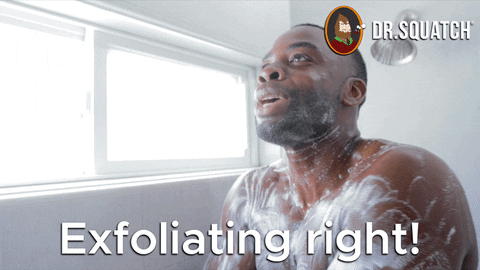 Giphy
GiphyI am a fan of DIY chemical peels; so much so that I wrote an entire article about it a couple of years ago (check out “I've Been Doing At-Home Chemical Peels. Here Are The Pros And Cons.”). The things that I like most about them are they are a super-effective way to exfoliate and even out my skin tone. That said, though, be careful with doing too much exfoliating whether it’s via a chemical peel, a skin scrub or even dry brushing.
Not only can over-exfoliating irritate your skin, it can dry it out, cause lots of skin flakes, lead to inflamed skin — and all of this can result in hyperpigmentation as your skin is in the process of “getting back to normal.” So, just how often should you exfoliate? Unless your skin is really oily, 1-2 times a week is more than enough (2-3 if it is on the oily side).
Layering with Too Many Products
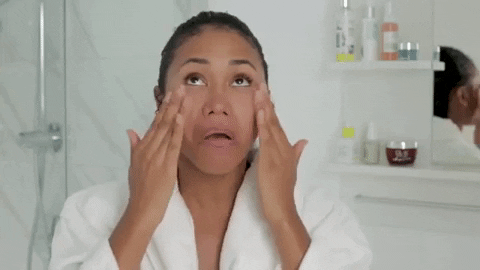 Giphy
GiphyOh, I know — if you watch too many of those TikTok and Instagram videos where women are applying 6-10 products on their face before adding any make-up to it, it can tempt you to follow suit. Use some caution with that, though. Each skincare product comes with its own list of ingredients and every time you add something else that has another set of ingredients onto it, that increases the chances of you irritating your skin or causing it to break out.
My two cents would be to ease into each product. Start with one thing and, if it’s all good (after about a week or so), incorporate another. Oh, and try to keep it down to 3-5 skincare products tops. When it comes to effective skin routines “less is more” is a motto to live by. Otherwise, redness, flaking and hyperpigmentation may be in your future.
Using Skincare Products That Contain Fragrance
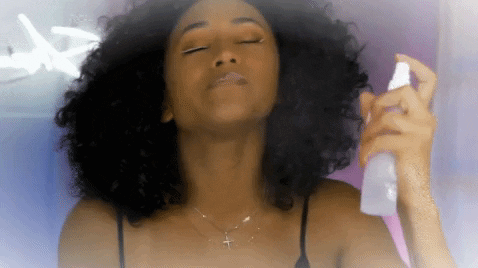 Giphy
GiphyAlthough applying skincare products that have a nice scent to them can cause your skin to smell amazing, sometimes they can be both an irritant as well as an allergen — and that can cause your skin’s barrier to weaken or become really irritated. And again, whenever your skin is damaged in some way, the recovery process can lead to hyperpigmentation. So, it really is best to avoid scented skin products at all costs (if you want flawless skin, that is).
Applying Too Much Heat
 Giphy
GiphyBet you didn’t see this one coming. How about increased blood flow, over time, can lead to hyperpigmentation. Basically, it’s because of the fact that, sometimes, too much consistent blood flow can result in skin inflammation and, as we already discussed, when the body is healing from inflammation, that can sometimes cause hyperpigmentation to occur.
The takeaway here: use sunscreen when you’re outdoors and try to keep those scorching hot showers to a minimum. Being in warm water for between 7-10 minutes is ideal.
Not Testing Products (Especially Acids) on Your Arm First
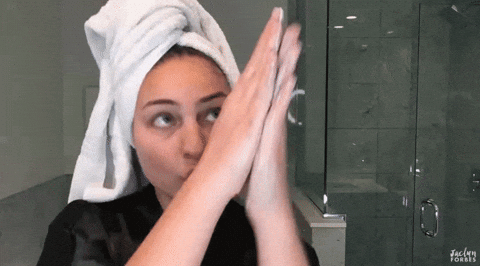 Giphy
GiphySomething that definitely keeps my skin glowing is certain acids: hyaluronic acid, mandelic acid and kojic acid soap (oh and some vitamin C extract too), especially. All of these are pretty good on darker skin tones; however, because we all are different, before applying any acid to your skin, make sure to test it on your arm first (and wait 48 hours, just to be sure that the coast is clear).
Trust me, I know of what I speak because I once tried some pretty potent pineapple extract on my face once and it mildly burned the lower part of my right cheek to the point where it took about four months before everything turned back to normal. Hmph, if I can keep anyone from experiencing that drama, I absolutely will.
7. Experimenting with Harsh Essential Oils
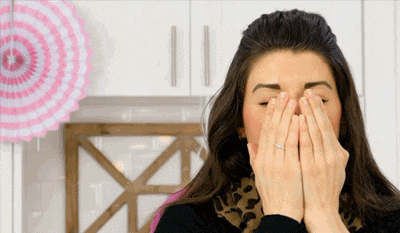 Giphy
GiphyListen, if you want a zit to go away, damn near overnight, apply some tea tree oil to it. Just make sure that you dilute it with a light carrier oil (like grapeseed, jojoba or rosehip oil) first. Why? Oh, I have learned from very up close and personal experience that certain essential oils can also burn your skin and, as we’ve already discussed, ad nauseum at this point, damaged skin typically results in hyperpigmentation on some level. Yeah, essential oils are a blessing. They are also nothing to play with. Dilute, dilute, DILUTE.
___
You know, they say that it can take several weeks, if not many months, for hyperpigmentation to totally fade away. Hmph. To me, that’s even more incentive to do all that you can to avoid it transpiring in the first place — and that includes NOT incorporating counterproductive skincare routines and regimens.
The more you know, sis. For real.
Let’s make things inbox official! Sign up for the xoNecole newsletter for love, wellness, career, and exclusive content delivered straight to your inbox.
Featured image by Shutterstock



